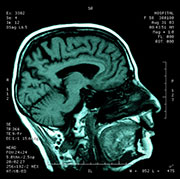- 8 Ways to Increase Dopamine Naturally
- 7 Best Breads for Maintaining Stable Blood Sugar
- Gelatin vs. Collagen: Which is Best for Skin, Nails, and Joints?
- The Long-Term Effects of Daily Turmeric Supplements on Liver Health
- Could Your Grocery Store Meat Be Causing Recurring UTIs?
- Are You Making This Expensive Thermostat Error This Winter?
- Recognizing the Signs of Hypothyroidism
- 10 Strategies to Overcome Insomnia
- Could Artificial Sweeteners Be Aging the Brain Faster?
- Techniques for Soothing Your Nervous System
Stroke Tied to Long-Term Mental Decline


Stroke victims often experience an immediate deterioration in their ability to think and reason. But a new study shows that a stroke also can have a more insidious, long-term effect on your mental processes.
People who suffer a stroke are more likely to experience an accelerated decline in their thinking and planning skills for at least six years following their medical emergency, according to a report published July 7 in the Journal of the American Medical Association.
For every year following a stroke, patients have a 23 percent greater risk of suffering additional mental loss, compared to how they would have fared if they never had a stroke, said lead author Dr. Deborah Levine, an assistant professor at the University of Michigan Medical School and a staff physician with the Ann Arbor VA Healthcare System.
“We found that stroke survivors had a significantly faster rate of developing new cognitive [thinking] impairment following their stroke, compared to their pre-stroke rates,” Levine said.
Stroke occurs when blood flow to the brain is disrupted, because of a clot or a hemorrhage. Each year in the United States, almost 800,000 people experience a stroke.
The study focused on nearly 24,000 participants in a larger U.S. National Institutes of Health-sponsored project that’s examining regional and racial differences in stroke deaths. The people were 45 or older and mentally healthy when they entered the study.
As part of the larger study, these people took part in an annual battery of brain-teasing tests that measured their ability to think, learn, remember and plan, Levine said. This allowed researchers to establish the extent to which their mental abilities were naturally eroding over time.
About 515 participants suffered a stroke during an average six-year follow-up period, the study reported.
The researchers found that after the stroke, these people suffered a significantly faster rate of long-term mental decline compared with their pre-stroke rate, Levine said.
The decline mainly centered around two domains primarily affected by stroke: global cognition and executive function, Levine said. Global cognition reflects a person’s overall ability to think and reason, while executive function reflects their ability to organize, prioritize, manage time and make decisions.
However, stroke did not seem to cause a long-term change in verbal memory, or the ability to learn new things, Levine said.
Dr. Aviva Lubin, associate stroke director at Lenox Hill Hospital in New York City, said these findings make sense based on what she’s observed with her own patients.
“I see patients that come through stroke, and afterward I hear from family members that they’re not able to handle their household as well as they had before,” Lubin said.
Lubin found the results particularly striking given that the researchers left out patients who had suffered aphasia — an impairment in their language abilities — as a result of their stroke.
“They took out one of the big symptoms that make patients seem like they are experiencing a cognitive decline,” Lubin said. “I think it’s interesting that they still found a connection even after excluding those patients.”
There are several possible factors that could cause this long-term decline, Levine said. Stroke is known to exacerbate conditions such as Alzheimer’s disease, but patients also might be suffering post-stroke symptoms or secondary strokes that cause ongoing injury to the brain.
Based on these findings, people in poor heart health should consider undergoing a screening of their mental abilities, said Dr. Philip Gorelick, medical director of the Hauenstein Neuroscience Center at Saint Mary’s Health Care in Grand Rapids, Mich.
That advance screening will help doctors track their progress and better assess the effects of any stroke they might experience in the future, said Gorelick, who wrote an editorial accompanying Levine’s study.
Stroke survivors who want to remain as sharp as possible should work with their doctor to reduce their risk of having another stroke, Levine said. That includes controlling their blood pressure and cholesterol, eating a healthy diet, exercising regularly and quitting smoking.
Lubin also recommends that stroke survivors do the types of things anyone can do to contribute to graceful aging of the mind. This includes playing memory games, solving brain-teasers and socializing on a regular basis.
More information
The National Stroke Association has more about preventing another stroke.
Source: HealthDay
Copyright © 2026 HealthDay. All rights reserved.










